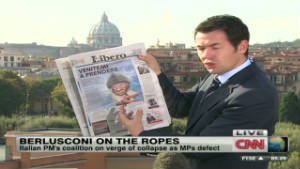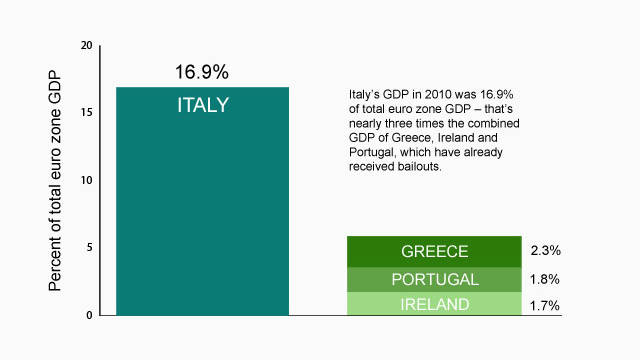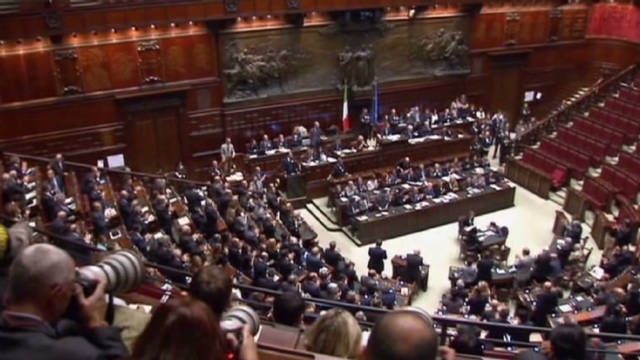Feed: CNN.com
Posted on: Tuesday, November 08, 2011 6:52 PM
Author: CNN.com
Subject: Berlusconi wins key budget vote but loses support
Italian Prime Minister Silvio Berlusconi wins a crucial vote on budget reforms, but loses his parliamentary majority as the opposition abstains. |
Italy's Berlusconi wins crunch budget vote, loses majority
- Berlusconi's government wins a key vote on budget reform measures
- But he is in a perilous position, with the support of fewer than half of Italy's lawmakers
- Berlusconi's main coalition ally says he asked the PM to take a sideways step
- Italian bond yields hit record highs
Rome (CNN) -- Italy's Prime Minister Silvio Berlusconi faces continued uncertainty Tuesday after parliament passed a key budget vote but he lost his parliamentary majority.
The budget passed by 308 votes, with all those present in the lower house voting for the measure, with one abstention.
However, more than half of the country's 630 lawmakers did not take part in the vote, a clear sign of unhappiness with the government -- and an indication that Berlusconi no longer commands the backing of a majority in parliament.
Opposition lawmakers chose to abstain as they did not want to prevent the budget being approved, since it is necessary for the government to function, but equally did not want to lend Berlusconi any support.
 Berlusconi wins crucial budget vote
Berlusconi wins crucial budget vote  Silvio Berlusconi on the ropes
Silvio Berlusconi on the ropes  How big is the Italian economy?
How big is the Italian economy?  How big is the Italian economy?
How big is the Italian economy?The 75-year-old prime minister has come under increasing pressure to resign in recent days amid growing unease over Italy's economy and may soon face a vote of confidence.
International concern has focused on Italy, the third-largest economy in the eurozone, in recent weeks amid concern that the financial crisis centered on Greece might spread.
Berlusconi, who said he would consider his next moves only after the budget vote, is now consulting with aides and political allies.
He was expected to visit President Giorgio Napolitano after the vote, regardless of the result.
Italy agreed to implement structural reforms during an European Union meeting in Brussels last month. Napolitano said the reforms must be put in place or risk Italy's credibility in the international community, raising questions over his confidence in the prime minister's ability to see them through.
Berlusconi denied rumors Monday that he might resign.
But his main coalition partner added fuel to the fire Tuesday, saying he had asked Berlusconi to take a sideways step.
Umberto Bossi of the Northern League suggested that the prime minister should be replaced by former Justice Minister Angelino Alfano, although his office played down the remarks as "not the official line."
If the Northern League were to withdraw its support from Berlusconi, it would be very difficult for him to recover.
A press aide to Berlusconi said he had no plans to resign, and a message on the prime minister's official Facebook page said: "The rumors of my resignation are groundless."
Berlusconi has survived many challenges to his leadership in the past. If he failed to win a confidence vote, it could result in new elections or the formation of a transitional government.
Although Italy passed a package of austerity measures in September, including tax increases, some economists fear that without further reforms, its debts could become overwhelming, and there would not be enough money in the European rescue fund to bail it out.
There are growing fears that Berlusconi's government no longer has the strength to push through the austerity measures needed to get the economy back on track.
These include tax increases and raising the retirement age by two years, to 67.
The markets are watching events in Italy closely, as the ripple effects of a meltdown in Italy would be far more serious for the global economy than a collapse in Athens.
Although Italy's economy is in much better shape than that of Greece, rising borrowing costs for the Italian government are adding to the pressure.
The nation, which has debts equal to about 120% of its economic output, has one of the largest bond markets in the world, worth an estimated 2 trillion euros (about U.S. $2.8 trillion).
Experts say the recent lofty interest levels are particularly concerning because the European Central Bank has been buying Italian bonds since the start of August. The move initially pushed yields below 5%, but that was short-lived.
Italian bond yields hit record highs Monday, getting perilously close to the 7% mark. The 7% level isn't an automatic bailout trigger, but it is the level that prompted bailouts for Portugal and Ireland.
Italian 10-year bond yields remained well above 6% Tuesday, reaching a high of 6.74% before easing to 6.62%.
Many protesters over the weekend called for Berlusconi to step down and said they want immediate elections. Others pushed for a technocratic transitional government to guide Italy through the difficult months to come.
Berlusconi said Friday at the G-20 economic summit that Italy had agreed to let the International Monetary Fund "certify" its reform program, a step designed to boost investor confidence.
CNN's Matthew Chance, Becky Anderson and Hada Messia contributed to this report.
















No comments:
Post a Comment